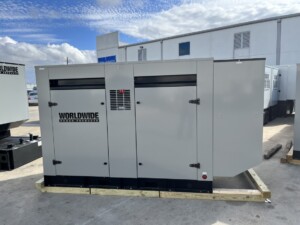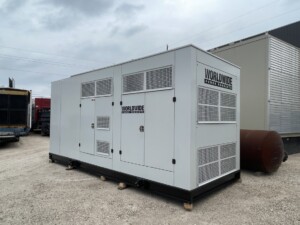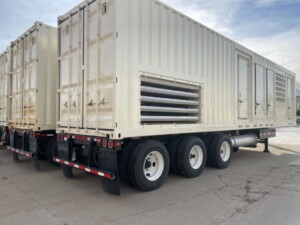What is a Nat Gas Generator?
At WPP, we carry and ship a huge number of premium-quality natural gas generators for sale and rent. We also have the expertise to deliver turnkey power solutions, from generator selection and design through to installation. Search our natural gas generator inventory.
A natural gas generator is a type of generator that runs on natural gas instead of the typical choices of gasoline or diesel. By the end of 2023, the United States had a total utility-scale electricity-generation capacity of 1,189,492 MW, equivalent to approximately 1.19 billion kW. Natural gas-powered generating units comprised the largest portion of this capacity. Compared with other generators that run on fossil fuels, natural gas generators are cost-effective, efficient to operate, and better for the environment. However, they’re not as flexible as other types of generators and won’t be the best choice for every application.
Read on to learn about the various types of natural gas generators, how to calculate the size you need, and more.
Types of Natural Gas Generators
When it comes to natural gas generators there are two main types:
Standby
Standby generators are common in both residential and commercial and industrial applications. In both cases, the natural gas generator is permanently installed and supplied with fuel from the local utility company. During power outages, the standby generator swings into operation automatically. It is only intended to run for a limited time during emergency periods, as operating a standby generator for more than its prescribed amount can cause malfunctions and the need for more frequent repairs.
Natural gas generators make an excellent choice for standby power because, while outages can happen, they are extremely rare for natural gas because the pipes are below ground and out of the elements. So, unless situated in an area susceptible to earthquakes, homeowners and business owners can rely on having an unlimited supply of generator fuel that doesn’t “go bad” like diesel or have to be stored in tanks.
Prime
Prime power generators are used when there is no local utility, hence the generated power is the only power source available. This type of natural gas generator is less common, especially for residential purposes, as most homes don’t have the ability to quickly connect to a natural gas line, and many have no gas line at all. And without a natural gas hookup to a utility line, the natural gas must be delivered by truck.
Prime power generators have much longer running times and can handle larger loads than backup generators. When a commercial natural gas generator is needed on a job site, the generator is typically transported there on a trailer or fifth wheel.
A subset of prime power generators are continuous power generators. The two are similar except that continuous generator sets are meant to run continually with a consistent load, while prime generators are built to run for long periods at variable loads.
Where Natural Gas Generators Are Used
Hospitals, nursing homes, and other large facilities where continuous power supply is critical routinely use natural gas, or diesel, generators instead of ones powered by gasoline. Gasoline has a limited shelf life and can be hard to come by when you need it most – in an emergency. Propane tanks can also become scarce during natural disasters. And as diesel generators are a notorious contributor to air pollution, companies looking to be more sustainable need another option.
For the same reason, installers of residential standby generators opt for natural gas so that the homeowner isn’t stuck with the chore of regularly cycling through fresh gasoline. In fact, the homeowner doesn’t have to “add” fuel at all, it comes over the utility line automatically when needed.
Sizing a Natural Gas Generator
First let’s look at choosing a generator size for your home. (Dual-fuel or tri-fuel portable generators that can run on either gasoline, propane, and/or natural gas are discussed below.)
A whole-home generator powers either everything in your house or a select group of items, so obviously the number of specific appliances and devices you need to power–and the size of your house–will determine what size generator you need. Common items include:
- Refrigerator
- Central A/C
- Gas furnace
- Washer and dryer
- Microwave
- TVs and laptops
- Well pump
- Electric range
- Home security system
Generators are sized by kW; the higher the kW rating, the more items you can power. A dealer like Generac will mention in the product information exactly how many circuits you can power with a specific generator. This way you can select only the items you want to power most. For example, a 7.5kW home standby generator may power 8 circuits, while an 11kW generator might power 16 circuits. If your home has less than 16 circuits, you’ll have true whole-house backup power.
You’ll likely need an electrician to help you calculate the running watts and starting (or surge) watts of the appliances you want to be able to continue to use during a power outage. The latter will be higher, as some appliances pull more power when they first turn on. Your generator will need to be able to meet the starting watts requirement.
Sizing a natural gas generator for industrial uses works the same: calculate your needs and ensure the generator is rated highly enough to handle the peak load.
Use our generator sizing guide to get started.
Dual-fuel Generators
Although some generators are built to run strictly on natural gas, many are able to utilize either natural gas or propane, or even diesel and gasoline, as well. These are called dual-fuel or tri-fuel generators. When it comes to portable generators, it’s difficult to find a natural gas-only model because finding a natural gas hookup on the go is difficult; dual-fuel and tri-fuel portable generators are much more common. Many industrial generators are dual-fuel rated, as well, opening their range of field applications: the operator can still get power by having propane tanks on-site.
A conversion kit makes it possible to equip your generator to accept natural gas. Tutorials on how to do this can easily be found online, and your kit will come with instructions. But if you’re still not comfortable tackling the project yourself, you can always hire a pipefitter to handle it for you. A good kit will not require adjustment to the frame, but allow simple installation of an adapter between the carburetor and air cleaner.
Some industrial-strength generators also have the ability to run on what’s called field gas, or raw gas that escapes from a wellhead during drilling operations. This gas is usually burned off, simultaneously wasting a viable fuel and polluting the environment. A generator equipped to use that raw gas as fuel saves its operators money they would’ve spent on diesel powering oil well pump jacks, man-camps, and other buildings.
Pros and Cons of Natural Gas Generators vs Diesel
As we’ve stated, natural gas standby generators’ closest rival are diesel generators. Let’s compare the two types and see which advantages and disadvantages you’re in for with each:
- Storage: Diesel is only good for a max of 24 months in storage, and storing large amounts is expensive. Natural gas generators never have to be refilled. Advantage: natural gas
- Costs: Natural gas units are less expensive to buy, and natural gas is the cheaper fuel of the two, but the prerequisite of running gas lines means higher installation costs. Diesel generators also typically last longer and require less maintenance and thus cost less to operate over their lifespan. (Slight) Advantage: Natural gas
- Safety: Diesel is the least flammable of all generator fuel sources, while a busted natural gas line is highly explosive. Advantage: diesel
- Ease of use: Both types start well in the cold, but diesel generators are not well-suited to wet conditions. Diesel generators also run the risk of “wet stacking,” the term for unburned fuel entering the exhaust system as a result of the engine running below its designed operating temperature for extended periods. Natural gas generators don’t have this issue. Advantage: natural gas
- Efficiency: Natural gas generators burn cleanly with very little waste, yet diesel generators are still more efficient, providing more useable power than a similar amount of natural gas. Advantage: diesel
- Environmental friendliness: Although natural gas generators do emit carbon dioxide, diesel exhaust is a noted, toxic air contaminant. Natural gas generators also produce less noise pollution. Read what makes natural gas generators an eco-friendly choice. Advantage: natural gas


